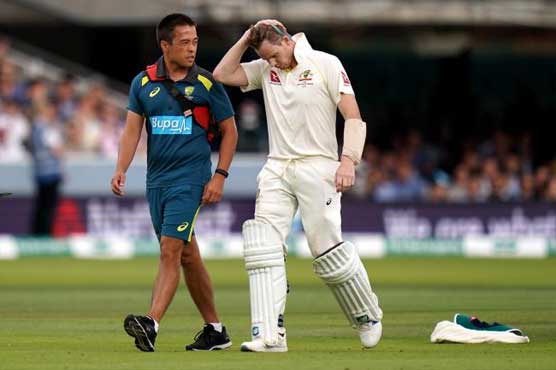Quick turnaround may see Smith miss third Ashes test

Quick turnaround may see Smith miss third Ashes test.
MELBOURNE (Reuters) - Batsman Steve Smith must be free of concussion symptoms for 24 hours before he can begin return to play protocols, Australia’s sports medicine manager has said, making him a doubt for the third Ashes test starting on Thursday.
Smith suffered a sickening blow to the neck from a Joffra Archer bouncer during the second test at Lord’s, forcing him off the ground for a medical assessment.
The right-hander returned to the crease 40 minutes later before being dismissed for 92 but he was then ruled out of the final day’s play and replaced by Marnus Labuschagne, who became test cricket’s first concussion substitute.
With the third test starting at Headingley in Leeds on Thursday, time may be Smith’s biggest enemy.
“He needs to be symptom free for 24 hours before he even gets to start the process,” Cricket Australia’s Alex Kountouris told reporters in Melbourne on Monday.
“So he is just recovering and sleeping, taking some time to feel better then after that he begins the process but there is obviously a very short time before the next test.”
Kountouris added that the decision on when Smith was able to return would be made solely by team doctor Richard Saw, who would follow the Cricket Australia protocols.
Saw made the decision to take Smith from the field on Saturday and, after a series of tests indicated no signs of concussion, allowed the batsman to continue his innings.
Smith, however, had developed symptoms overnight and after further testing on Sunday, which is part of the process, Saw ruled him out of the fifth day.
“Delayed concussions are reasonably common,” Kountouris added. “About 30% of concussions are delayed. So it’s not uncommon and why we test the players the next day.”
Kountouris added that any criticism about allowing Smith to return to the crease was misguided, given he had not presented with any signs.
“Everything he (Saw) did was according to the protocol,” Kountouris said.
“At the time Steve did not have a concussion. He was fine to play. If we left him out of the game it would have been for only what we saw on the field.
“The reality is that only about one in five or six head impacts end up being concussions, which is why we monitor them. If you look at that game there were three other head impacts and only Steve developed a concussion.
“If we pulled every player out who had a head impact we’d be pulling out 80% of the players who don’t have a concussion. That would be an over reaction.”
The second test ended in a draw, with Australia leading the series 1-0 after winning the opener at Edgbaston.

